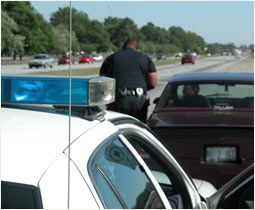We all learn from more experienced officers to ask a suspect of a serious crime to write a confession. Why not apply that to some of the more serious traffic stops? Every good officer involved in traffic enforcement learns to ask questions that elicit admissions (such as driving on a suspended or revoked license) and then makes notes. An effective officer also makes detailed notes of other factors, but how many ask the violator to write a confession on the ticket or piece of paper that could be used as evidence in court?
 In Virginia, driving with a suspended or revoked license is a Class 1 misdemeanor with a maximum sentence of one year in jail. To convict a violator, though, an officer must show that the accused had notice of the suspension, and some defendants say they had no such notice to try and escape conviction. Notice can be made numerous ways. It can be done by the court when part of a sentence is a loss of license. The Division of Motor Vehicles can also suspend a license for failing to maintain insurance, excessive point accumulation or other administrative violations, and the agency attempts to give notice by certified mail. Law enforcement officers can also make notification via official contact, usually a traffic stop, but not always. Before going to court, the officer obtains a certified driving record from the DMV hoping that it will show notification. One flaw is the mailed notice. The violator’s address may not be current, or the notice was accepted by someone at the residence other than the addressee. The obvious defense is that the violator did not receive proper notice.
In Virginia, driving with a suspended or revoked license is a Class 1 misdemeanor with a maximum sentence of one year in jail. To convict a violator, though, an officer must show that the accused had notice of the suspension, and some defendants say they had no such notice to try and escape conviction. Notice can be made numerous ways. It can be done by the court when part of a sentence is a loss of license. The Division of Motor Vehicles can also suspend a license for failing to maintain insurance, excessive point accumulation or other administrative violations, and the agency attempts to give notice by certified mail. Law enforcement officers can also make notification via official contact, usually a traffic stop, but not always. Before going to court, the officer obtains a certified driving record from the DMV hoping that it will show notification. One flaw is the mailed notice. The violator’s address may not be current, or the notice was accepted by someone at the residence other than the addressee. The obvious defense is that the violator did not receive proper notice.
To avoid this, why not ask the violator for a written statement? I usually get a verbal acknowledgment that the violator knew of his suspension once I learn it from dispatch or CAD. I explain the ticket and hand back the driver’s license, registration and summons. I tell him that we are through, but I have a favor to ask. It goes something like this: “You know, you’ve been a good guy and haven’t given me a hard time. I appreciate that. You even admitted to me that you knew your license was suspended. Would you mind writing that on the bottom of my copy and signing it? Now, you don’t have to. I want you to understand that. I will have it with me in court, and when the judge asks me if there was anything significant about the stop, I will show it to him. I will tell him what a cooperative guy you were. You can even tell the judge that you wrote it before I say anything, and ask that I produce it for you. Now, you don’t have to do this, but since you have been so cooperative, I thought I would ask.”
You would be surprised how many times they reach for the summons and pen before you finish. They frequently write more than you ask, to include what a great job I did. I have a success rate of 90 to 95 percent getting the written confession for the more serious traffic violations, and a 100 percent conviction rate. You will also drive the defense attorney crazy when he sees that you took the time to solicit a written confession from his client for a misdemeanor traffic offense, and he now has no defense. It does wonders for your reputation with your peers, attorneys and the court. This is also excellent practice for getting written confessions for those times when you investigate more serious crimes.

